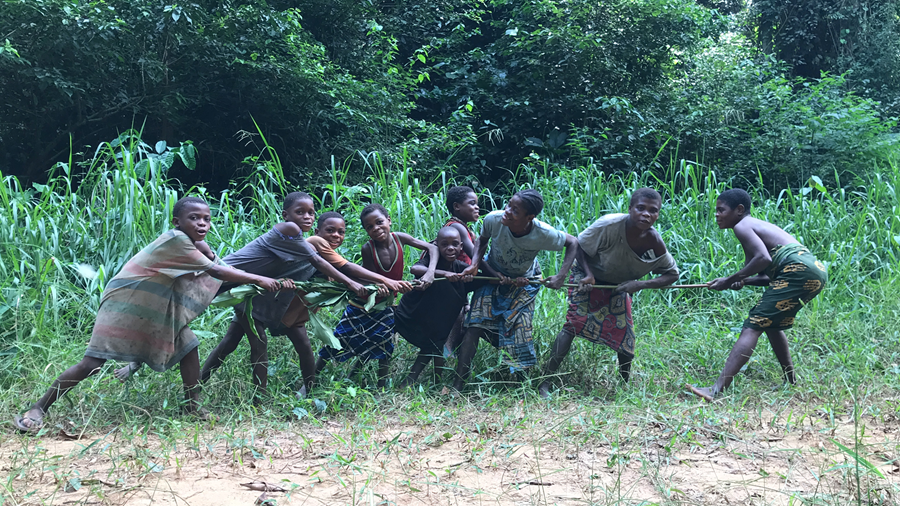SURF Research Cloud played a pivotal role in uncovering insights into the evolutionary function of music: Does music serve an evolutionary purpose, or is it merely “auditory cheesecake,” as cognitive psychologist Steven Pinker once claimed—a delightful by-product of language? The debate on the origins of music has intrigued scientists for centuries. Hypotheses range from music being a mating display to a means of increasing social bonding within groups.
Hunter-gatherer society
A group of international and interdisciplinary researchers tested several hypotheses on music. For two years, they observed the behaviours of the BaYaka people, a hunter-gatherer society living in Congo, during their daily search for tubers—their staple food. The researchers combined data on the BaYaka’s behavior with other variables: whether they sang or not, if they carried an infant during foraging, the group composition while searching for tubers, and the likelihood of encountering dangerous animals.
Avoiding conflict
The project, led by Karline Janmaat, Professor in Cognitive Behavioural Ecology at the University of Amsterdam (UvA), included renowned music researcher Prof. Henk-Jan Honing (also UvA) and MSc student Chirag Chittar. The team found that women of the BaYaka were more likely to sing in large groups of strangers and less likely to sing in groups of people they were close with when looking for tubers. This led the researchers to conclude that these people use music and song as tools to avoid conflict. The study was published in the scientific journal Frontiers in Psychology.
Essential for survival
“Formation of highly cooperative alliances is essential for the survival of the BaYaka, who live in ever-changing precarious environments,” explains Chirag Chittar. “We think that music can act as an icebreaker to gauge the skills or even encourage the enthusiasm of strangers. Trust is essential for this society to thrive, as conflicts can occur between individuals co-residing in forest camps. We believe that in this way, music can help in mitigating conflict and encouraging cooperation.”
Extensive dataset
Originally from India, Chittar came to the Netherlands to pursue his master’s degree at the UvA. “I was interested in paleoecology, and the Netherlands was the place to go for that. Especially the universities of Amsterdam and Leiden have good professors who specialize in the subject.” For his thesis project, Chittar became involved with Karline Janmaat. Janmaat and her former PhD student Haneul Jang had previously collected an extensive dataset in Congo, which Chittar analyzed using the SURF Research Cloud.
Complex models
“I found the platform extremely efficient and useful. Some of the complex models that I used for analyzing the data took half the time to run on the Research Cloud than what they would usually take. Testing the model to see if it would yield consistent results over several iterations would cost me a day on my laptop but only 15 minutes on the Research Cloud.”
The best part
Chittar’s study period in the Netherlands ended, and he returned to India amidst the second COVID-19 wave, “which caused havoc across the world, including my country.” But even there, he could continue working on the SURF Research Cloud and, together with Prof. Janmaat, prepare the analyses for publication in the scientific journal. “I think that was the best part of using the Research Cloud: I could continue collaborating with my professor and run analyses on a system that’s based in the Netherlands, while I was abroad.”
Guinea pigs
Chittar was one of the first students in Janmaat’s group to use the Research Cloud. “The service has developed a lot further since 2021, so more of her students are using it now, also internationally. We were kind of like guinea pigs in using the service, so we could give feedback to SURF as well about how they could improve certain aspects, which was extremely helpful.”
Currently, Chittar is pursuing his PhD in the Anthropology department at the University of Zurich in Switzerland.
This is an edited version of a case study written by Josje Spinhoven, first published on the SURF website: Harmony in the forest, cross-border collaboration in the cloud







